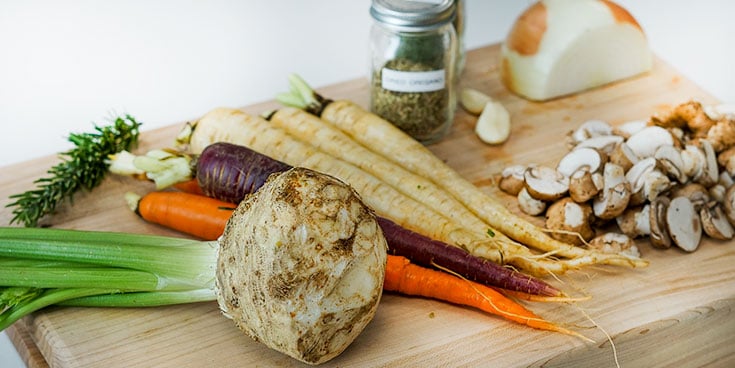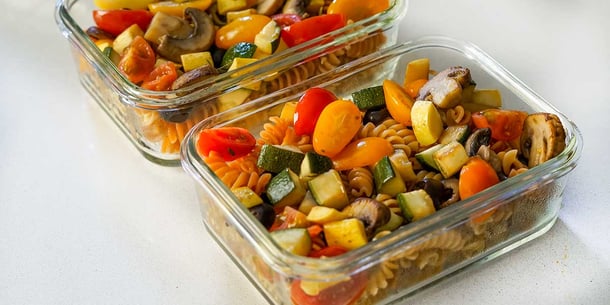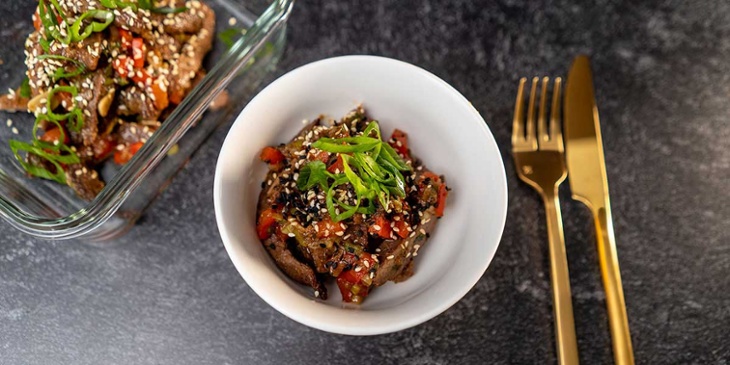How does what you eat impact inflammation and disease? I've gathered the essential information you need to know about inflammation and nutrition. Explore what foods may be the culprit of inflammation in your body and how they may be impacting your health.
You’re probably more familiar with inflammation than you may think. The lingering pain you felt from a bee sting, the redness around a scratch, and the warmth and swelling you felt from a reaction to poison oak are all signs of inflammation at work.Inflammation plays a role most of the time we get injured or sick to help heal our bodies, but inflammation might also hurt our bodies.
Scientists are finding that certain foods as well as chronic conditions like obesity and high blood pressure, may be contributing to a type of chronic inflammation that causes us harm.
Common foods thought to cause inflammation in the body may include:
What is Inflammation?
Inflammation is part of your body’s response to help fight off infection, injury, or irritants that you’re exposed to.
So, inflammation isn’t always bad. In fact, it’s a core part of our survival response to threats from our environment. It’s intended to be there for your protection.
Classic signs you’re having an inflammatory response are redness or warmth on your skin, swelling, and pain.
While you can easily see and feel these effects from say, a bee sting, many more parts of the inflammatory process are going on beneath your skin surface that may be affecting your overall health and well being.
Is Inflammation Normal?
Inflammation is created by your immune system, which is in charge of protecting your body from harm.
It’s part of a cascade of different responses that happen when there is an injury or threat to our body. Infections, foreign bodies, toxins, and injuries are all perceived as such threats.
Attacking foreign particles, sweeping away damaged materials, and helping to heal is the overall goal of the immune system. As you may imagine, this is a really complicated process that involves many different signals and specialized cells such as macrophages and white blood cells to be effective.
Acute inflammation happens quickly, sometimes within minutes. But it also usually goes away quickly - often within hours to days.
Chronic inflammation occurs if the immune system thinks a threat still exists. In such cases, an inflammatory response can persist for weeks to months or even years.
Other lifestyle factors like smoking, an unhealthy diet, obesity and low levels of physical activity may also contribute to an inflammatory response.
How Does Inflammation Impact Disease?
We need a Goldilocks amount of inflammatory and anti-inflammatory forces - just the right balance. When not controlled, the same signals and cells that help to protect us can become destructive.
An overactive inflammatory response can begin to have a negative impact on, or even start attacking healthy parts of our body.
Classic examples of this are autoimmune conditions like celiac disease, rheumatoid arthritis, and lupus (SLE). These diseases are all caused by an immune system that has gone awry.
But a ramped-up immune response seems to be involved in many more diseases than previously thought. This likely includes many cancers, heart disease, diabetes, high blood pressure, high cholesterol, and asthma to name just a few.
While we may not see inflammation at work as clearly as we do when our skin is injured and appears red and swollen, these diseases may involve a chronic inflammatory process that’s happening inside our bodies at the level of our blood vessels, tissues, and/or organs.
We can try to measure these responses by looking at blood markers such as c reactive protein (crp), however these are often hard to interpret as they’re not as specific and immune interactions can be so complicated.
What Foods are Negatively Impacting Your Health?
Many people believe that certain foods cause inflammation.
Some scientists think that this may be in part caused by how natural bacteria living in our gut (our microbiome) respond differently to different types of food. Some studies suggest that certain foods cause these good gut bacteria to release inflammatory markers that may be bad for our health (1).
The truth is that there isn’t yet enough research to say one particular food is going to make or break your inflammatory balance. In fact, it’s probably much more complex than that altogether.
Overall your diet and lifestyle as a whole may impact inflammation in the body, certain chronic conditions such as obesity have been associated with pro-inflammatory mechanisms (2)
Minimizing foods that may stimulate some extra inflammation is also minimizing your intake of foods high in calories with low nutritional value.
By choosing to become more intentional with what you eat and developing healthier diet habits, you lower your risk of being overweight which in-turn may reduce inflammation thought to be associated with obesity.
It also lowers your risk of many of the other nutrition-related chronic diseases inflicting almost half of all Americans such as diabetes, high blood pressure, and heart disease.
Ultra-Processed Foods
Extensively processed foods are thought by many to be a culprit in stimulating an inflammatory response. As you might imagine, ultra-processed foods are categorized as those that involve the highest level of processing.
NOVA is a classification system based on how extensively food is processed. It categorizes ‘ultra-processed foods’ as products that often contain at least 5 added ingredients, of which they describe “include substances not commonly used in culinary preparations”.
NOVA further describes the intent of these ingredients to ‘disguise undesirable sensory qualities of the final product’ or ‘imitate sensory qualities’ of natural foods (3).
Ultra-Processed foods are formulations of ingredients derived from foods and additives, including substances such as colorings, flavorings, sweetness and emulsifiers.
These tend to be fatty, sugary or salty, energy-dense foods that lack any nutritional value or beneficial compounds; evidence suggest these foods are pro-inflammatory and associated with a poorer diet quality (4).
14 Ultra-Processed Items:
- Prepackaged Candies
- Ice Cream and Related Dairy Products
- Mass Produced Packaged Breads
- Mass Produced Packaged Snacks
- Margarine
- Chocolate
- Cakes
- Packaged Cereals
- Reconstituted Meat Products aka Processed Meats (ie: hot dogs, sausages, ‘nuggets’)
- Sodas
- Most Other Carbonated Drinks
- Most ‘Ready to Heat’ or ‘Ready to Eat’ Packaged Products
- Most Packaged ‘instant’ Products (ie: Instant noodles)
- Packaged Chips
Substances Only Found in Ultra-Processed Foods:
- Hydrogenated Oils
- Interesterified Oils
- Hydrolysed Proteins
- Soy Protein Isolate
- Maltodextrin
- High Fructose Corn Syrup
- Colour Stabilisers
- Colour Dies
- Emulsifiers
- Sequestrants
Growing research supports that people that fill their diet with these ultra-processed foods are more likely to be obese and suffer from nutrition-related chronic health conditions including high blood pressure and some types of cancer (5).
But not all processed foods are bad.
These potentially inflammatory ultra-processed foods are different from some lightly processed foods that may actually be good for us but are still considered to be ‘processed’ because their organic nature is slightly altered.
An example of this is frozen vegetables such as sweet potatoes; or fresh-squeezed orange juice, which is processed to be juice - but still healthy and fresh.
Added Sugar Hidden in Your Diet

Another culprit suspected to cause unwanted inflammation is added sugar (6). But it can sometimes be hard to tell that it's sugar when disguised under different names.
Overconsumption of sugar in the diet often comes in the form of refined carbohydrates, such as high-fructose corn syrup. Evidence suggest increased consumption of fructose may contribute to insulin resistance causing obesity and other unwanted health risks (6),
13 Sources of Added Sugar:
- High Fructose Corn Syrup
- Corn sugar
- Dextrose
- Fructose
- Maltose
- Molasses
- Sucrose
- Agave
- Maple syrup
- Honey
- Glucose
- Levulose
- Isoglucose
Luckily, the FDA has required nutrition labels to clearly list how many added sugars are included vs. natural sugars, that are found in fruit and some vegetables.
How To Reduce Sugar Intake
Cutting back on added sugar in your diet can potentially decrease inflammation and the risk of disease. It can also help manage your energy levels, appetite, and mood better with improved blood sugar control.
The US Dietary Guidelines recommend keeping added sugar intake below 10 percent of total calories consumed and the American Heart Association recommends no more than 25g of added sugar per day.
To put that into context, a 20 oz bottle of soda contains 65g of sugar, which is equivalent to 1.77 shot glasses. One serving of kids cereal has as much as 20g of added sugar.
Here are some quick tips to reduce added sugar in the diet and be more intentional with what you eat:
- Cook more at home where you can control what gets added
- Reduce your consumption of ultra-processed foods
- Read the ingredients label, look for ingredients with sugar or syrup in the name, or that en in "-ose"
- Focus on incorporating more vegetables
Fats That May Cause Inflammation
Finally, certain fats are also implicated in a pro inflammatory response - particularly saturated fats and trans fats (7).
These fats have become more prevalent in our food system, often finding there way into the ultra-processed foods listed above to extend their shelf-life.
9 Items High In Saturated Fat and Trans Fat:
- Butter
- Lard
- Cream
- Cheese
- Fatty Meats including Fatty Beef
- Poultry with Skin
- Margarine
- Lamb
- Pork
But not all fats are bad, no single food or type of fat can make or break your health, your overall diet and lifestyle have a much larger impact.
Unsaturated fats like omega 3 fatty acids found in salmon are rich in nutrients and probably have an anti-inflammatory impact.
The amount of fat and the type of fat in your diet can have a major impact on your overall health and wellness (7).
The Bottom Line
Food may be a powerful factor contributing to our inflammatory response both in the type of foods we regularly consume as well as the strong influence both the quality and quantity of food has on developing obesity and other chronic conditions.
Scientists are still learning exactly how diet plays a role in inflammation and the development of disease.
Minimizing what many people believe are inflammatory foods including ultra-processed foods, unhealthy fats such as trans fats, and added sugar is part of a well accepted healthy approach.
As is choosing to include higher intake of nutrient-dense whole foods in a calorie-controlled diet will lead to a healthier nutrition foundation and reduce potential health risks.
Overall, everyone can benefit from becoming more intentional with their diet by including foods with a good source of essential micronutrients such as fruits, vegetables, and leafy greens.
The Role of Good Nutrition

When it comes to inflammation, one answer doesn’t fit all.
If you're looking to improve your health a great place to start is by assessing your diet.
If you feel like you may consume too many of the foods listed above, start with swapping out some of those foods with anti-inflammatory food choices. These foods have super nutrients that help your health in many ways and may work to decrease inflammation in your body.
However, Anti-inflammatory diets are controversial as there aren’t enough well-done studies to show exactly if or how these diets truly reduce harmful inflammation in the body.
Healthy Choices May Include:
- Foods rich in omega-3 fatty acids: salmon, tuna, sardines
- Leafy Greens: spinach, kale, collard greens, chard
- Whole Grains: whole wheat, brown rice, oats, rye, quinoa
- Beans: pinto, black beans, garboanzo
- Nuts & Seeds: walnuts, pecans, pinenuts, almonds, pistachios
- Whole Vegetables: Onion, Turmeric, Sweet Potatoes, Carrots, Bell Pepper, Squash
- Fruits: Cherries, Plums, Red Grapes, Blueberries, BlackBerries, Strawberries
There is an entire diet devoted to fighting inflammation, called the anti-inflammatory diet, that is actually recommended by the arthritis foundation. However the extent to which this diet can directly influence inflammation is still controversial because so much about inflammation in the body, especially as it relates to diet is still not well enough understood.
Maintaining a healthy weight through a healthy diet, regular exercise, and lifestyle practices that limit exposure to unwanted toxins is probably the best way to battle unhealthy inflammation.
Easy Recipes for Balanced Health
Cooking at home is a great way to pack your diet full of nutrient-dense foods and use nutrition as a foundation of optimal wellness. Here are some of our favorite go-to meal prep recipes full of healthy fats, fruits and vegetables, and whole-grains.
Breakfast Recipes

- Turkey And Sweet Potato Breakfast Casserole Recipe
- Apple-Sauce Protein Pancakes Recipe
- Cheesy Vegan Tofu Scramble Recipe
Lunch Recipes

Dinner Recipes

- Italian Caprese Salmon with Quinoa Recipe
- Paleo Mongolian Beef Recipe
- Homemade Vegetarian Chili Recipe
No time to meal prep? We have your back!
Make sticking to a calorie controlled, healthy diet easier than ever with tasty, ready to eat weight loss meal plans shipped directly to your door.
